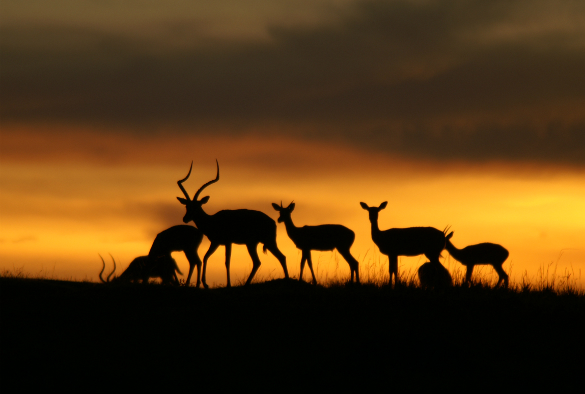Climate change will cause a disproportionate decline in African antelopes within the smallest geographic ranges, placing the most-threatened in ‘double jeopardy,’ according to new University of Liverpool research.
The findings are the first to suggest that animals already living in the most-restricted areas will be hardest hit as the climate shifts in the coming decades, and show that several antelope species are in need of urgent conservation action to avoid extinction.
Forecasting the future
Scientists had suspected that animals with the smallest ranges might be at the greatest risk as the climate changes. That’s because small ranges imply that species thrive under a very narrow range of conditions. Even small changes in climate could push those species outside of their comfort zones.
African antelopes presented researchers with an ideal opportunity to study the relationship between species’ range sizes and the effects of climate change because of their diversity. Antelopes are also an increasing conservation concern, with one-third of the world’s 87 species now listed as threatened.
The researchers began by modeling the current ranges of 72 African antelope species based on their known ecological requirements and current environmental conditions. They then generated forecasts of where those species might live in the future based on multiple models of climate change by the year 2080.
For 82 percent of African antelope species, the forecasts show a decline in suitable habitat by 2080 due to the effect of climate change, with antelopes preferring cooler and drier climates likely to be the hardest hit. About one-quarter are likely to see their range size drop by half.
Conservation priority
None of Africa’s antelopes are predicted to improve their threat status on the IUCN Red List as a result of changes in climate, and the threat status of ten species is predicted to worsen as a direct result of climate change, the report shows.
Dr Jakob Bro-Jørgensen, from the University’s Institute of Integrative Biology, said “Our study shows that climate change is likely to hit wildlife even harder than we thought because the species already threatened stand to lose a higher proportion of their range.”
“If we switch to more conservation-friendly land use, the threatened species with small ranges stand to benefit the most, having the greatest potential to expand their ranges. A major priority is to target the increasing fragmentation of wilderness areas, which prevents wildlife from tracking shifts in their environment.”
‘Disproportionate Climate-Induced Range Loss Forecast for the Most Threatened African Antelopes’ is published in Current Biology. Funding was provided by a Duncan Norman Trust studentship and an RCUK fellowship.
